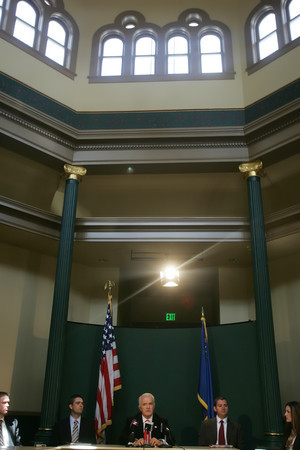Governor may call special session
CARSON CITY -- Gov. Jim Gibbons said Tuesday there is a good chance he will have to call a special session of the Legislature sometime over the next year and a half because he doubts the tax increases approved by lawmakers will produce the revenue they expected.
"If the Legislature had cut spending, there would be no need for a special session," Gibbons said during a news conference in the state Capitol. "I don't want one."
But he doubts the tax increases approved by the Legislature will produce the $1 billion anticipated.
In particular, he said a law that increases the payroll tax to 1.17 percent, from 0.63 percent, will not bring in the $346 million that is hoped for.
Instead, Gibbons predicted, employers will lay off workers, and the state's unemployment rate, now 10.6 percent, will increase.
"No one has a crystal ball, but my concern is we are still spending too much," he added. "What segment of our economy is doing so well that it can afford a tax increase?"
Gibbons vetoed all tax bills but one, and then the Legislature overrode his vetoes. He did not sign, but let go into effect, a bill that raised the room tax rate by 3 percentage points, which is expected to bring in $220 million over two years.
If tax revenues come up short, Gibbons said he will need to call the Legislature back to Carson City to consider ways to balance the state's $6.9 billion, two-year budget.
Special sessions used to be rare but have become increasingly common. Two one-day special sessions dealt with budget shortfalls in 2008.
Assemblywoman Debbie Smith, D-Sparks, said she can't understand how Gibbons can say tax revenue will be short when the Legislature used the Economic Forum projections for its estimates.
"We used the Economic Forum, just like he does," said Smith, who could become Assembly Ways and Means chairwoman in 2011. "We did the best we could to provide accurate estimates."
The Economic Forum is a group of five business leaders who estimate the amount of revenue the state will have available to spend.
Smith, however, concedes there will be a special session if the economy worsens.
But she noted that most businesses are small, and those with a payroll of less than $250,000 will be paying slightly less in taxes: 0.5 percent.
For a midsized or large company, the payroll tax on an employee earning $49,000 a year, considered the average state wage, will be $573.30 a year, $264.60 more than the current $308.70 tax.
Assemblywoman Sheila Leslie, D-Reno, added that legislators were conservative in their tax revenue projections.
"He (Gibbons) is setting himself up to say 'I told you so' if the economy continues to falter," she said.
"No one knows what the economy will be like six months from now, not even Jim Gibbons. We might be wrong. We have been wrong before, like Jim Gibbons."
Governors set the agenda on what legislators can consider during special sessions.
Unlike most states, the Nevada Legislature meets in regular session only for 120 days during odd-numbered years. The next regular session begins February 2011.
Legislators, however, have numerous interim committees that make it seem as if they are meeting all of the time.
Gibbons said during the news conference that he does not see an economic recovery for Nevada anytime soon.
He added he had hoped for a rebound in the housing market, but now it appears there will be "another bubble" of foreclosures caused by home buyers' inability to cover costs of adjustable rate mortgages.
Contact reporter Ed Vogel at evogel@reviewjournal.com or 775-687-3901.






















